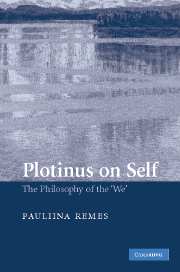Book contents
- Frontmatter
- Contents
- Acknowledgements
- Note on editions and abbreviations
- Introduction
- PART I THE ENDOWED STRUCTURES OF SELFHOOD
- PART II CONSTRUCTING THE SELF: BETWEEN THE WORLD AND THE IDEAL
- 4 Sculpting your self: self-determination, self-control and self-constitution
- 5 Action and other people: the self as a citizen of two communities
- 6 Losing the limits of the self?
- Conclusion
- Bibliography
- Index locorum
- General index
5 - Action and other people: the self as a citizen of two communities
Published online by Cambridge University Press: 26 October 2009
- Frontmatter
- Contents
- Acknowledgements
- Note on editions and abbreviations
- Introduction
- PART I THE ENDOWED STRUCTURES OF SELFHOOD
- PART II CONSTRUCTING THE SELF: BETWEEN THE WORLD AND THE IDEAL
- 4 Sculpting your self: self-determination, self-control and self-constitution
- 5 Action and other people: the self as a citizen of two communities
- 6 Losing the limits of the self?
- Conclusion
- Bibliography
- Index locorum
- General index
Summary
In the previous chapters, three general tendencies in Plotinus – or in my interpretation of his philosophy – have become evident. First, the metaphysical hierarchy is explanatory both of the sensible realm in general and more specifically of anthropology as well as human selfhood, psychology and cognition. Plotinus' otherworldliness should therefore not be overstated. Second, Plotinus gives due attention to the nature of temporal and bodily human beings, and considers the sensible realm a necessary starting point for any advancement in both epistemological and therapeutic issues. Third, his radical and (from today's perspective) unappealing emphasis lies, rather, in what he considers as normatively ideal: pure reason, separated from the body and from external influences, directed to itself and its internal objects, the eternal forms. Despite my efforts to show the rationale and motivation behind these views, the third emphasis raises pressing questions about the relation – both real and ideal – a Plotinian philosopher has to the world he lives in as well as the significance of other people in his primarily inward-directed existence. The topic of this chapter is the self in the sphere of action and morality. Its purpose is to explicate what significance action holds in Plotinus' system, what consequences the therapeutic separation from the body and the inward turn have for moral action, and whether, from our point of view, the self-directed and self-absorbed self-improvement endangers other-regard and morality.
- Type
- Chapter
- Information
- Plotinus on SelfThe Philosophy of the 'We', pp. 213 - 238Publisher: Cambridge University PressPrint publication year: 2007



